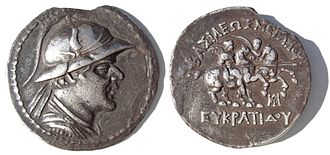Greco-Bactrian Kingdom
Hellenistic-era Greek kingdom in Central Asia
The Greco-Bactrian Kingdom was a Hellenistic-era Greek kingdom in Central Asia, covering the areas of modern-day Afghanistan, Tajikistan, and Uzbekistan. It was founded when Diodotus I declared independence from the Seleucid Empire around 256 BC. The kingdom lasted until approximately 125 BC when it was overrun by the Yuezhi.
History
Foundation
The Greco-Bactrian Kingdom was established by Diodotus I, a satrap of the Seleucid Empire, who declared independence around 256 BC. This secession marked the beginning of a series of Hellenistic states in Central Asia.
Expansion
Under the rule of Euthydemus I and his successors, the kingdom expanded its territory, reaching as far as the Indus River in the south and the Tarim Basin in the east. The Greco-Bactrians are known for their military prowess and their ability to maintain control over a vast and diverse territory.
Decline
The kingdom began to decline in the 2nd century BC due to internal strife and external pressures. The Yuezhi, a nomadic tribe, invaded Bactria around 125 BC, leading to the collapse of the Greco-Bactrian Kingdom. The remnants of the kingdom eventually evolved into the Indo-Greek Kingdom.
Culture
The Greco-Bactrian Kingdom was a melting pot of Greek and local cultures. The Greek language was widely used, and Greek art and architecture influenced local styles. The kingdom was also a center for the spread of Buddhism into Central Asia and China.
Economy
The economy of the Greco-Bactrian Kingdom was based on agriculture, trade, and coinage. The kingdom was strategically located on the Silk Road, facilitating trade between the Mediterranean and Asia. Greco-Bactrian coins are notable for their high artistic quality and Greek inscriptions.
Legacy
The Greco-Bactrian Kingdom played a crucial role in the cultural and economic exchanges between the East and the West. Its legacy can be seen in the spread of Hellenistic culture and the introduction of Greek artistic and architectural styles in Central Asia.
Related Pages
This article is a ancient Greece–related stub. You can help WikiMD by expanding it!
Transform your life with W8MD's budget GLP-1 injections from $125.
W8MD offers a medical weight loss program to lose weight in Philadelphia. Our physician-supervised medical weight loss provides:
- Most insurances accepted or discounted self-pay rates. We will obtain insurance prior authorizations if needed.
- Generic GLP1 weight loss injections from $125 for the starting dose.
- Also offer prescription weight loss medications including Phentermine, Qsymia, Diethylpropion, Contrave etc.
NYC weight loss doctor appointments
Start your NYC weight loss journey today at our NYC medical weight loss and Philadelphia medical weight loss clinics.
- Call 718-946-5500 to lose weight in NYC or for medical weight loss in Philadelphia 215-676-2334.
- Tags:NYC medical weight loss, Philadelphia lose weight Zepbound NYC, Budget GLP1 weight loss injections, Wegovy Philadelphia, Wegovy NYC, Philadelphia medical weight loss, Brookly weight loss and Wegovy NYC
|
WikiMD's Wellness Encyclopedia |
| Let Food Be Thy Medicine Medicine Thy Food - Hippocrates |
Medical Disclaimer: WikiMD is not a substitute for professional medical advice. The information on WikiMD is provided as an information resource only, may be incorrect, outdated or misleading, and is not to be used or relied on for any diagnostic or treatment purposes. Please consult your health care provider before making any healthcare decisions or for guidance about a specific medical condition. WikiMD expressly disclaims responsibility, and shall have no liability, for any damages, loss, injury, or liability whatsoever suffered as a result of your reliance on the information contained in this site. By visiting this site you agree to the foregoing terms and conditions, which may from time to time be changed or supplemented by WikiMD. If you do not agree to the foregoing terms and conditions, you should not enter or use this site. See full disclaimer.
Credits:Most images are courtesy of Wikimedia commons, and templates, categories Wikipedia, licensed under CC BY SA or similar.
Contributors: Prab R. Tumpati, MD







